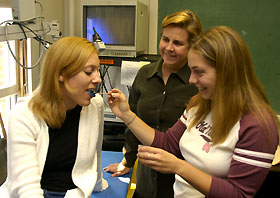|
This is an archived article.
For the latest news, go to the
Advance Homepage
For more archives, go to the Advance Archive/Search Page. | ||
|
Variations In Taste Perception
You could be one of the 25 percent of the population who are supertasters: individuals who have heightened oral sensations from foods and beverages.
"Supertasters live in a different oral sensory world than nontasters, who also make up about 25 percent of the population," says Valerie Duffy, an associate professor of allied health. This may explain why supertasters and nontasters have different food and beverage likes and dislikes. Duffy, who has a joint appointment in allied health and nutritional sciences at UConn and also a visiting appointment in the Yale School of Medicine, has been conducting studies on variations in taste, and how these differences influence what people like to eat. "It's important research, because we eat what we like and avoid foods that don't taste good to us," Duffy says. "Understanding why people eat what they do can help dietitians and nutritionists tailor diets that not only can lower the risk of diseases such as cancer and cardiovascular disease, but are also enjoyable to eat." Supertasters report a higher level of bitterness in spinach, broccoli, grapefruit, alcoholic beverages, dark chocolate, and strong coffee. They have less preference for foods that are rich in sugar and fat and avoid foods that are creamy, such as ice cream and mayonnaise, because they "don't like the feeling of fatty foods in their mouths," Duffy says. Supertasters are also more sensitive to irritants like the capsicum in chili peppers and the bubbles in carbonated water. You can blame your genes if you're a supertaster, at least in part. Duffy says one marker for genetic variation in taste is the perceived bitterness of a chemical, 6-n-propylthiouracil (PROP). Participants in Duffy's studies are asked to taste a small piece of paper coated with PROP. To nontasters, the paper is tasteless; to medium tasters, moderately bitter; and to supertasters, intensely bitter. Subjects are also tested for the number of structures that hold taste buds on the tongue tip, the fungiform papillae. When blue food coloring is swabbed on subjects' tongues, fungiform papillae resist the coloring and are visible as small pink circles against a blue background. Supertasters have the most fungiform papillae. Duffy is exploring relationships between these markers of genetic variation in taste and what we like and choose to eat, as well as the risk of chronic disease such as cardiovascular disease and cancer. Variation in taste and oral sensation extends beyond genes, Duffy says. Bitterness, for example, varies with changes in sex hormones and women are more likely than men to be supertasters. Heightened perception of bitter taste is seen at the beginning of pregnancy - possibly to support a healthy pregnancy, Duffy notes - and throughout menopause, sensitivity to bitter taste may actually decline. Older women may be more accepting of bitter vegetables than younger women, and this may have health advantages, she says: "Eating more fruits and vegetables is the primary dietary message to reduce your risk of cancers like colon cancer." Duffy and her students are also exploring differences in oral sensations and food behaviors related to conditions such as middle ear infection. "Anything that affects the taste system interacts with genes to influence oral sensations and dietary behaviors," she notes. "The bottom line is that we live in very different oral sensory worlds, and this affects what we like," Duffy says. Supertasters' hypersensitivity to bitterness may cause them to avoid foods that carry cancer-preventive compounds - like broccoli or Brussels sprouts - which are often bitter. But their avoidance of fats and alcohol may be good for their hearts. "Supertasters' dislike of fat and alcohol may make them less likely to develop cardiovascular disease," Duffy says, noting that supertasters appear to have lower cholesterol levels than other people. "Diet plays a role in preventing cardiovascular disease," she says. "But despite public health efforts, people are not generally adhering to diets that minimize the risks. Understanding why people eat what they do is an important piece of the puzzle." |
 f the flavor of
spinach makes you cringe, some beers are just too
bitter, and you don't like much mayonnaise on your
sandwich, you may not just be a picky eater.
f the flavor of
spinach makes you cringe, some beers are just too
bitter, and you don't like much mayonnaise on your
sandwich, you may not just be a picky eater.

